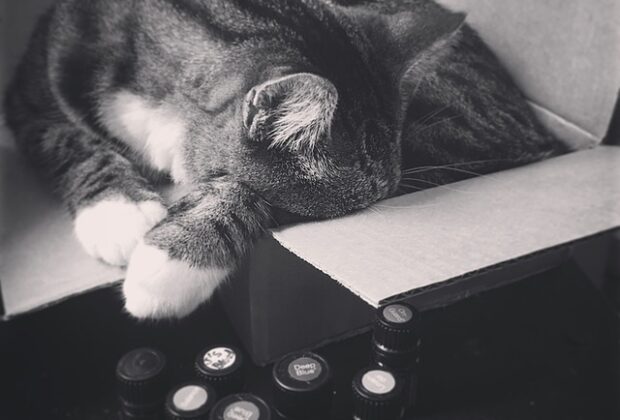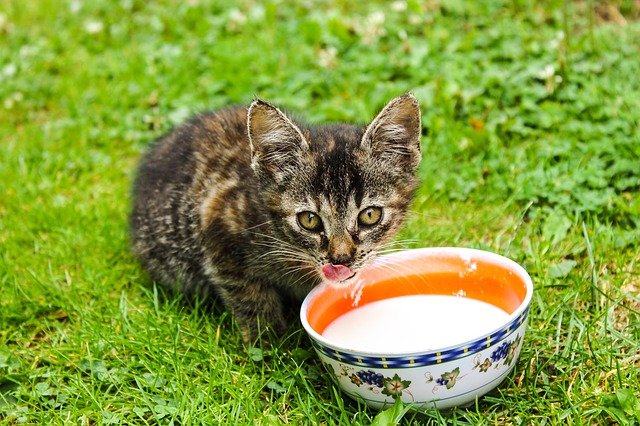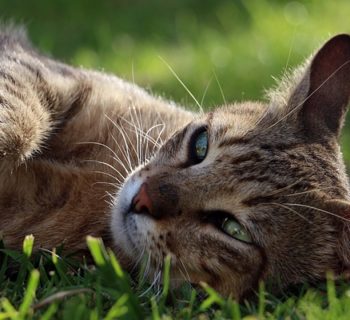Many feline parents want the best for their kittens, from the best cat foods and cat toys to the safest, natural products to make their fur baby’s lives easier. Many owners spare no cost when it comes to providing their cat with the very best care. If this sounds like you, you’re probably here because you’re considering adding essential oils to your cat’s supplies.
You’ve heard and experienced some of the many benefits essential oils offer to humans, and now, you want to know what essential oils are safe to diffuse around cats. This article will discuss all you should know about essential oils for cats. I’ll outline some safety precautions for using an essential oil, the best types that are safe for your feline, and how you can use them safely.
Essential Oils for Cats: Is It Safe?
Are essential oils safe for felines? Yes, essential oils can be safe for cats. However, before use, note that cats are deficient in glucuronyl transferase and other human enzymes responsible for metabolizing and eliminating phenols and phenolic acid. And these compounds are commonly contained in pharmaceuticals and health products.
Phenols and phenolic acids are also present in many essential oils, making them unsafe for use around your feline. If you must use a phenol-containing essential oil around your cat, ensure it is only contained in small concentrations to keep the risk to your cat’s health minimal.
Aside from the above, you should avoid some essential oils because of our felines’ sensitivity to their ingredients. These have been found to cause breathing issues, vomiting, lethargy, and paralysis, among other potentially fatal effects. You should never use them even in small quantities.
Safe Essential Oils for Cats and Their Benefits
ESSENTIAL OIL | BENEFIT |
|---|---|
Sweet Marjoram | Aside from calming inflammation and discomfort from digestive issues, Sweet Marjoram is known to enhance relaxation, confidence, and tranquillity. It is also known to calm the mind and body when restless, excited, nervous, or hyperactive.
|
Frankincense Carterii | This oil is known to relieve mental and emotional issues, aside from being an effective anti-microbial/anti-bacterial. Frankincense Carterii is effective against emotions like anger, irritability, and fear and also improves tranquillity and confidence. |
Ginger | Ginger is known for its effectiveness against inflammation and pain, and the essential oil is no different. It is known to promote better breathing, calm inflammation, and emotional distress. |
Clary Sage | Effective at enhancing tranquillity and the sense of well-being while also containing anti-bacterial and antifungal properties. |
Lemongrass | Lemongrass is known for its anti-inflammatory and mood-enhancing properties. The oil is no different as it is known to offer these benefits and even more. |
Chamomile (Roman or German) | It is known to ease stomach issues and improve the mood. Chamomile is effective against hyperactivity, panic, restlessness, and nervousness and is also excellent for skin and fur. |
Myrrh | Myrrh is calming on the skin, improves mental alertness, eases emotional and mental distress, and enhances confidence and security. It is also effective against irritability, fear, anger, and other negative feelings your feline may experience. |
Cedarwood Virginian | Aside from boosting the sense of relaxation and tranquillity, Cedarwood Virginian is effective against common feline pests hence, reducing the chances of your pet getting bites from them. The oil is also known to support immune function, skin health, enhance the mood and reduce hyperactivity and restlessness. |
The above is not an exhaustive list. There are several other safe essential oils for cats and, in fact, other pets like dogs. You have to ensure that you confirm from the list below and run a quick web search if you’re unsure about any essential oil or its contents.

List of Essential Oils to Avoid for Cats
While the essential oils listed here are safe for human use, they can be quite the opposite for felines. And if you must use them for yourself with cats in the house, you should keep it inaccessible and use it far away.
- Thyme oil
- Sweet birch oil
- Citrus oil
- Lavender oil
- Wintergreen oil
- Garlic oil
- Cinnamon oil
- Orange oil
- Lemon oil
- Lime oil
- Nutmeg oil
- Clove oil
- Eucalyptus oil
- Tea tree oil
- Anise oil
- Cassia oil
- Cypress oil
- Oregano oil
- Basil oil
- Yarrow oil
- Ylang-ylang oil
- Tansy oil
- Grapefruit oil
Again, this is not an exhaustive list; therefore, do your due diligence before using any oil you might be unsure of its effect on your feline or any other pet.
Precautions for Safe Essential Oil Use for Felines
You want to be sure that any essential oil you use on or around your cat is confirmed safe for felines and moderately applied. Even though a particular essential oil may be perceived as pleasant smelling by you, it can overwhelm your kitty. And if you have to use such, have a room ready for your cat to retreat to if needed.
Essential oil use tips for felines
- Despite their “pleasant smell”, you should handle essential oils the same way you would manage other potentially hazardous liquids. Yes, even the ones certified safe for pets. They should be kept in a cool, dark area away from your pets' reach and the usage instructions followed.
- Keep your pets away from areas of the home cleaned or dabbed with essential oil. Be it safe for it or not, as your pet will ingest the oil in a bid to lick it off its fur.
- Avoid rubbing essential oils on areas that can quickly get into your pet’s mouth, e.g., feet, hands, and parts of the fur that it can easily reach.
- Opt for only essential oils known to be safe for felines
- Use only pet-safe doses for your cat. Do not use human doses, no matter how safe it may seem.
- If using a diffuser, do not allow to run for too long, non-stop, or overnight.
- Unless otherwise stated in packaging, never use an essential oil on your pet without diluting.
- Only use essential oil in a well-ventilated room, ensuring that there is a spare room for your pet if need be.
- When using any essential oil for the first time, please test a small amount of it first. You want to check for and pick out possible adverse reactions and stop use altogether if intolerable to your pet.
- If you must use essential oils in areas of your pet’s body that are easily accessible to the mouth, make sure you keep that part covered after applying.
Using diffusers and potential health hazards
Our felines are a lot more sensitive to smells than we are. So, inhaling odours you may find mild could cause nose irritation, nausea, drooling, watery eyes and nose, and breathing difficulty with the latter marked by panting, fast breathing, wheezing or coughing. None of these reactions is normal in felines or any other pet.
If it’s a hairball issue, you may notice your cat crouching with no or little abdominal movement. If it’s an adverse reaction to essential oils or any other potentially hazardous chemicals, you’ll be able to tell.#
Essential Oils for Your Cat: Conclusion
Before using a new product, natural or synthetic, food, or medicine, you should always consult your vet. Essential oils are no exceptions, and you should always make sure they are safe to diffuse around cats. Let your vet or expert cat handler know you are adding or removing something from your feline’s routine.
Even after you begin the essential oil use, look out for unusual behaviors like the ones mentioned above and unusual redness in your feline’s skin. You should also check for scratching or pawing after their exposure to the oil.
If you notice any of the symptoms, move your pet immediately to an open, well-ventilated area. And if symptoms persist even after exposure to fresh air, contact your vet or a poison helpline.
Not all cats will not have the same reaction to essential oil or any other scented substance. However, in delicate health or with respiratory conditions such as airborne allergies, asthma, and even those exposed to long-term second-hand smoke, cats with sensitive skin will likely have more severe reactions. With these pets, you want to be exceptionally observant when introducing a new product, e.g., an essential oil into their routine. Or even when considering adding essential oils to your routine.
About the Author
Kirsten Heggarty
Kirsten created The Pet Handbook with the aim of sharing her knowledge about pets, pet food, healthy habits, and more. All of her advice is based on years of her own experience with her pets, and feedback that she has received from grateful readers about her tips. If you want to know more please read the About Me page.









